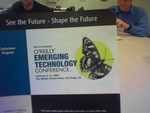I’m heading down to a conference where pretty much everyone will be using wifi to stay connected to the net. It’s simple because the wifi access points are open and you can easily connect.
The problem is that pretty much anyone can see what you are doing, except if you take special precautions. For the most part, transmission is in the clear and an eavesdropper can see what you type. That includes user names, passwords, and anything else you do online.
I’ve been to a few conferences with many people using wifi on open access points and it’s amazing what you can see. Wifi sniffers are easy to find and they show everything flying by in the airwaves. An unscrupulous person could have dozens of usernames and passwords in a couple minutes.

There are several solutions to protect yourself. If you have some tech saavy you can ensure you are only using secure email and SSL secured web sites, but for most of us, this is a pain.
The simplest solution is to use a Virtual Private Network, commonly called a VPN. A VPN is a way to tunnel your internet traffic through a secure pipeline that eavesdroppers can’t see through. VPNs are typically used by businesses to ensure that their networks are secure from snooping when staff connect to them via modems or wifi.

Once your data is in a secure tunnel, you can do whatever you want and people can’t intercept your data.
Again, the super tech saavy, can build their own VPN and proxy servers to allow themselves to surf securely. I tried to do it myself, and I decided it was a huge pain in the ass.
Luckily for me I found a service that provides me with a VPN and secure access for a fairly inexpensive rate.
HotSpotVPN is made for people that want to attach to open wifi hotspots but be secure. I gave the service a try and it seems to work well. Speed is the real key to pulling this off. To do the encryption and proxy redirection uses resources and you usually see the impact as reduced effective bandwidth.

Here’s the speed of the VPN sitting the dining room connecting via 802.11b to my DSL line. Pretty good. I wouldn’t want to move gigabytes of data, but great for email, surfing, and blogging.

This is the speed of my wifi access without the VPN. Almost three times as fast. This will be the first time I’m using HotSpotVPN and will be able to give a better report on performance in a few days.
I think it’s a reasonable compromise. A drop in speed to protect my usernames and password from flying around in the open.
Don’t say I didn’t warn you…






